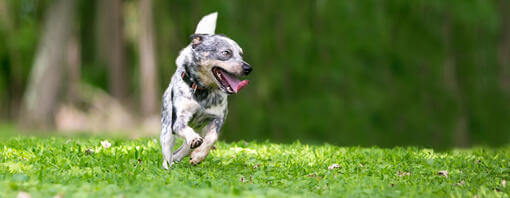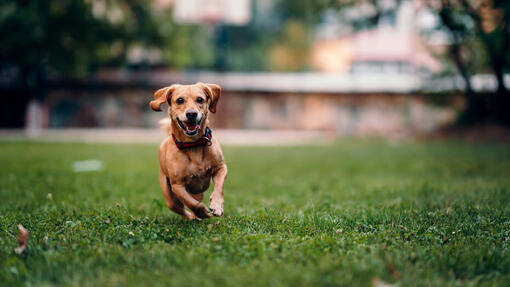
If you’re a dog owner, it’s likely you’re well versed in the sudden bursts of energy that have our dogs (and especially puppies) spinning like tornados and doing laps around the coffee table like it’s an Olympic track. But have you ever paused to wonder, what are they doing exactly?
This behaviour is known as ‘dog zoomies’ and we’ve put together this guide to tell you everything you need to know about it.
What is dog zoomies?
The proper name for dog and puppy zoomies is ‘Frenetic Random Activity Periods’ or FRAPs. These periods usually display as sudden bursts of energy where your dog may run around in circles, usually with their backend tucked in, chase their tail and do laps of the house and/or garden. Typically, dog zoomies won’t last very long and will be over almost as soon as they began, and your dog will plonk themselves down for a much-needed rest.
What causes dog and puppy zoomies?
Zoomies is generally caused by a build-up of excess energy which is then released in one short burst. Don’t worry though, it’s a completely natural behaviour. It’s most common and generally occurs less and less as they get older. But that’s not to say it’ll stop entirely – many older dogs will still have FRAPs!
When do dog zoomies commonly occur?
Although it’s caused by excess energy build-up, there are a few occasions that are likely to cause a FRAP, including:
- Just before bed: your dog may be trying to blow off steam before a longer period of rest
- After a bath: dogs may experience an adrenaline rush after bathing and may either feel relief that they’re out of the bath or are trying to dry off (or perhaps both)
- After eating: this is particularly common with very food-orientated dogs
- During a training session: sometimes when we’re trying to teach our dogs something and they’re not quite getting it, it can lead to a build-up of nervous energy
Are dog zoomies harmful?
The behaviour itself isn’t harmful, but sometimes the area in which they do it can be dangerous, particularly if they’re constantly skidding on laminate or hardwood floors or running into furniture. If you think your dog will harm themselves in the house, instead of trying to stop the behaviour, just direct the behaviour outside instead or if not possible, a carpeted area.
Sometimes dogs will get very excited and a FRAP will occur when they’re on a walk and let off the leash, which can cause owners to panic and think they’re running off. If they do this it’s important that you don’t run after them as they will see this as a game and think you’re joining in!
Instead, you should run in the opposite direction and get in the habit of carrying high-reward treats, so when they come to you, give them a treat and in future they’ll be more willing to come to you. Alternatively, if they’re frequently running off and the area is dangerous, keep them on a long leash so they’re secure but have plenty of space to run.
If your dog’s zoomies seem to be happening a lot, it may be a sign that they’re not getting enough exercise. You could try longer walks (age and breed dependent) and mentally stimulating toys such as puzzles and snuffle mats.
That’s our guide to dog and puppy zoomies! Want to find out more about your dog’s behaviour? Learn why your dog stares at you, next.












